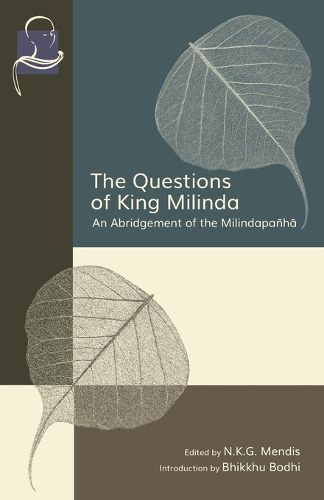Readings Newsletter
Become a Readings Member to make your shopping experience even easier.
Sign in or sign up for free!
You’re not far away from qualifying for FREE standard shipping within Australia
You’ve qualified for FREE standard shipping within Australia
The cart is loading…






Today the encounter between Buddhism and Western civilization has been hailed as a cultural event of far-reaching significance, promising to exercise a major impact on both partners to the meeting. However, the first encounter between Buddhism and the West took place long ago, in Northwest India during the age of Alexander the Great, and it resulted in one of the most sublime works of Buddhist literature, The Questions of King Milinda.
This work, preserved in the Pali language, is an imaginative record of a series of discussions between the Bactrian Greek King Milinda (Menander), who reigned in the Punjab, and the Buddhist sage Bhante Nagasena. Their spirited dialogue-dramatic and witty, eloquent and inspired-explores the diverse problems of Buddhist thought and practice from the perspective of a probing Greek intellectual who is both perplexed and fascinated by the strangely rational religion he discovered on the Indian subcontinent.
The present abridged edition has been adapted from existing scholarly translations, and includes in an easily readable style the most essential passages of the original classic.
T.W. Rhys Davids, the first translator of the text into English, ventures the opinion that "the Questions of Milinda is undoubtedly the masterpiece of Indian prose, and indeed is the best book of its class, from a literary point of view, that had then been produced in any country." The great Buddhist commentator Acariya Buddhaghosa cites the Milindapanha as an authority in his Visuddhimagga and his commentaries to the Pali Canon, while in Burma the book has actually been included in the Sutta Pi?aka itself, as part of the Khuddaka Nikaya or Miscellaneous Collection. Although the Buddhists of the other Theravada countries have not gone quite so far in expressing their esteem, in all those lands where the Pali Tipi?aka reigns supreme the Milindapanha stands just behind it as a weighty textual source for resolving knotty problems of doctrine and as a gem of classical Pali literature.
$9.00 standard shipping within Australia
FREE standard shipping within Australia for orders over $100.00
Express & International shipping calculated at checkout
Stock availability can be subject to change without notice. We recommend calling the shop or contacting our online team to check availability of low stock items. Please see our Shopping Online page for more details.
Today the encounter between Buddhism and Western civilization has been hailed as a cultural event of far-reaching significance, promising to exercise a major impact on both partners to the meeting. However, the first encounter between Buddhism and the West took place long ago, in Northwest India during the age of Alexander the Great, and it resulted in one of the most sublime works of Buddhist literature, The Questions of King Milinda.
This work, preserved in the Pali language, is an imaginative record of a series of discussions between the Bactrian Greek King Milinda (Menander), who reigned in the Punjab, and the Buddhist sage Bhante Nagasena. Their spirited dialogue-dramatic and witty, eloquent and inspired-explores the diverse problems of Buddhist thought and practice from the perspective of a probing Greek intellectual who is both perplexed and fascinated by the strangely rational religion he discovered on the Indian subcontinent.
The present abridged edition has been adapted from existing scholarly translations, and includes in an easily readable style the most essential passages of the original classic.
T.W. Rhys Davids, the first translator of the text into English, ventures the opinion that "the Questions of Milinda is undoubtedly the masterpiece of Indian prose, and indeed is the best book of its class, from a literary point of view, that had then been produced in any country." The great Buddhist commentator Acariya Buddhaghosa cites the Milindapanha as an authority in his Visuddhimagga and his commentaries to the Pali Canon, while in Burma the book has actually been included in the Sutta Pi?aka itself, as part of the Khuddaka Nikaya or Miscellaneous Collection. Although the Buddhists of the other Theravada countries have not gone quite so far in expressing their esteem, in all those lands where the Pali Tipi?aka reigns supreme the Milindapanha stands just behind it as a weighty textual source for resolving knotty problems of doctrine and as a gem of classical Pali literature.